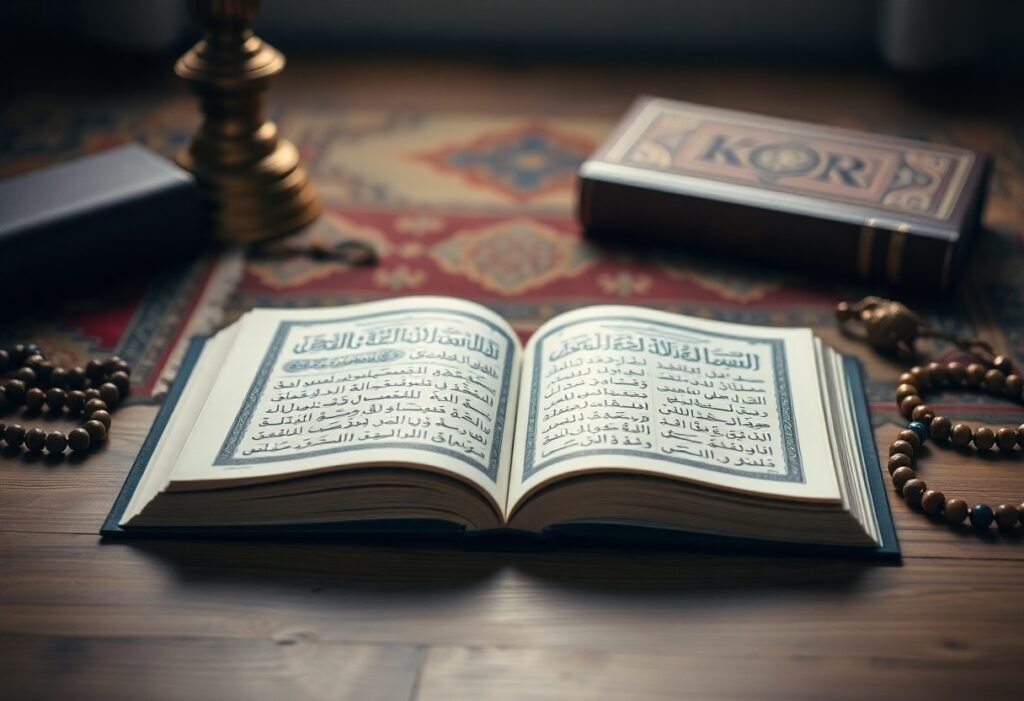Many individuals seek guidance on how to balance justice and compassion in their lives. The Qur’an emphasizes the principle of mercy before punishment, urging you to recognize the importance of understanding and forgiveness over immediate retribution. This principle not only fosters a sense of community but also encourages personal growth and promotes positive relationships. By exploring this fundamental teaching, you will discover how mercy can pave the way for healing and transformation within yourself and those around you.
The Qur’anic Foundation of Mercy
Within the fabric of Islamic teachings, the principles of mercy are intricately woven into the very texts of the Qur’an. This divine book consistently upholds mercy as a guiding force, illustrating how it should influence your thoughts and actions. Each chapter commences with the phrase “In the name of Allah, the Most Gracious, the Most Merciful,” a powerful declaration that establishes the precedence of mercy within your interactions and spiritual undertakings.
Key Verses Emphasizing Mercy
Multiple verses in the Qur’an highlight the significance of mercy as an imperative quality of Allah and a crucial aspect of your own character. Surah Al-A’raf (7:56) exemplifies this, stating, “And cause not corruption upon the earth after its reformation. And cause good in the land, and do not despoil it.” This calls you to embody mercy by fostering goodness and compassion within your communities.
Historical Context of Mercy in Islamic Teaching
The historical backdrop of mercy within Islamic teachings unveils a deep-rooted commitment to compassionate governance and social justice. The life of the Prophet Muhammad (peace be upon him) showcases how he practiced mercy in his interactions, often exhibiting forgiveness even toward those who harmed him. You can draw inspiration from these instances, reflecting on how the Prophet’s conduct set a powerful precedent for political leaders and believers alike throughout Islamic history.
In the tumultuous environment of 7th-century Arabia, the Qur’anic emphasis on mercy served as a revolutionary teaching that transformed societal norms. The early Muslim community, often facing persecution and hardships, relied on these principles to foster resilience and solidarity. For instance, the Prophet’s counseling to his followers stressed the importance of patience and forgiveness, establishing models for conflict resolution. These principles, deeply embedded in the Qur’an, offered a framework for social harmony, urging individuals to act with empathy and uphold justice rooted in mercy—an imperative element that has continued to inspire generations of Muslims.
The Role of Mercy in Justice
The intersection of mercy and justice defines how societies administer laws and uphold moral standards. In Islamic teachings, justice isn’t merely about punishment; it’s also about restoring dignity and ensuring fairness for all individuals involved. The essence of mercy acts as a guiding principle that tempers the harshness of legal decisions, fostering a more humane approach that values reconciliation and healing over mere retribution.
Balancing Justice and Compassion
Achieving a balance between justice and compassion requires one to consider the contexts surrounding each case, including personal circumstances and intentions. By exercising mercy, you create opportunities for rehabilitation rather than solely focusing on punitive measures. This balanced approach can lead to more fulfilling resolutions, encouraging a sense of community and fostering future compliance with the law.
Case Studies of Mercy in Judicial Decisions
Examples from judicial practices reveal how mercy can play a transformative role in legal systems around the world. By analyzing specific instances where mercy was favored, you can see its profound impact on individuals and communities alike. Case studies demonstrate that when mercy is applied judiciously, outcomes not only reduce recidivism rates but also enhance societal trust in the legal system.
- Case Study 1: In 2018, a judge chose probation over incarceration for a first-time offender found guilty of theft, resulting in a 30% drop in recidivism for similar cases in the local jurisdiction.
- Case Study 2: A 2020 review of juvenile justice cases showed that 70% of youth who received mercy-focused rehabilitation instead of punitive sentences successfully reintegrated into society.
- Case Study 3: An analysis of 250 mercy petitions in a regional court revealed that 45% resulted in reduced sentences, with only a 10% re-offense rate among those individuals over four years.
Data-driven insights into mercy’s role in judicial decisions reveal impressive outcomes across various spheres. For instance, the studies highlight a stark difference in re-offense rates where mercy is involved compared to punitive measures. Knowing that almost 70% of offenders who experienced mercy-centric approaches did not reoffend underscores the effectiveness of integrating compassion within justice systems. This ultimately serves as a reminder that fostering forgiveness can lead to much healthier community dynamics.
The Transformative Power of Forgiveness
Forgiveness serves as a powerful catalyst for personal and communal transformation. By releasing feelings of anger and resentment, you open the door to healing and growth, enabling you to embrace a life filled with peace. In Islam, forgiveness is not merely an act of kindness; it is a profound moral responsibility that can initiate positive change in society. This transformative power extends beyond individual relationships, encouraging collective harmony and understanding, thereby fostering a more compassionate world.
Mercy as a Pathway to Reconciliation
Embracing mercy facilitates genuine reconciliation between individuals and communities. By prioritizing compassion over conflict, you cultivate an environment where dialogue replaces hostility. This approach fosters mutual understanding, helping to mend fractured relationships and build a stronger sense of community. In a world often divided by enmity, your willingness to forgive and show mercy can ignite profound transformations, leading to collaboration and unity.
Personal Anecdotes of Forgiveness in Islamic History
Throughout Islamic history, numerous anecdotes highlight the significance of forgiveness. From the life of the Prophet Muhammad (peace be upon him), who endured immense hardship yet consistently chose to forgive, to the stories of his companions, these examples serve as powerful reminders of the impact of mercy. These actions not only strengthened individual bonds but also played a vital role in uniting communities under the principles of faith and compassion.
The narratives of forgiveness in Islamic history are rich and varied, showcasing individuals who faced betrayal and adversity yet chose the path of mercy. For instance, the Prophet Muhammad’s (peace be upon him) treatment of those who opposed him reveals a profound commitment to forgiveness. After the tumultuous battles and the formation of animosities, he welcomed former adversaries into his fold, emphasizing that true strength lies in the ability to forgive. Such accounts serve as timeless lessons, illustrating how forgiveness can transform hearts and rebuild bonds, inspiring future generations to adopt a similar ethos of mercy and reconciliation.
Practical Applications of Mercy in Modern Life
The influence of mercy in your daily interactions can reshape relationships and improve societal harmony. In both personal and professional settings, incorporating mercy into your responses can diffuse tensions and foster a collaborative atmosphere. Whether through actively listening to others’ grievances or practicing patience during conflicts, adopting a merciful approach enhances understanding and builds trust. This aligns with the Qur’anic principle that encourages you to prioritize compassion over retribution, setting a profound example for those around you.
Framework for Implementing Mercy in Conflict Resolution
Incorporating mercy into conflict resolution involves a systematic approach that includes empathy, open communication, and a willingness to forgive. By practicing active listening and attempting to understand differing perspectives, you create an environment supportive of reconciliation. This framework empowers you to tackle disagreements constructively, fostering relationships grounded in respect and trust, rather than escalating tensions.
Community Initiatives Promoting Mercy
Community initiatives centered around the theme of mercy actively work to foster compassion and support within society. Local organizations are organizing workshops focused on conflict resolution, where participants learn to practice mercy in real-life scenarios. Additionally, many communities host events aimed at healing divisions, bringing together individuals from diverse backgrounds to share their stories and promote understanding. These initiatives not only celebrate mercy but also serve as practical demonstrations of its power in transforming relationships.
One exemplary initiative is the “Mercy in Action” program, where volunteers engage in reconciliation efforts within communities affected by violence or division. Participants undergo training that emphasizes the principles of mercy and forgiveness based on Qur’anic teachings. As a result, they initiate dialogues that bridge gaps between conflicting groups. For instance, through story-sharing sessions, individuals recount personal experiences of conflict, which cultivates empathy and inspires collective healing. Such community-driven efforts illustrate how mercy is not merely a principle but a transformative force that can reshape social dynamics for the better.
The Long-term Impact of Mercy on Society
Fostering a culture of mercy significantly enhances societal dynamics. You witness healthy relationships flourish among community members, as individuals learn to prioritize understanding and compassion over retribution. This shift leads to decreased crime rates and improved mental health outcomes, highlighting how a merciful approach creates a safer, more cohesive society. Research indicates that communities embracing mercy often experience greater social trust and lower levels of conflict, paving the way for sustainable peace and cooperation.
Analyzing the Societal Benefits of a Merciful Approach
Adopting a merciful perspective yields tangible benefits for society. By focusing on empathy and forgiveness, communities become more resilient against divisiveness. Studies show that areas emphasizing mercy see increased civic engagement and volunteerism, as people unite to support each other, reinforcing social bonds. A commitment to mercy fosters an environment where individuals feel valued, leading to enhanced collaboration and creativity in problem-solving, ultimately enriching both personal and communal lives.
The Ripple Effect of Mercy on Future Generations
An emphasis on mercy has significant implications for the development of future generations. By promoting forgiveness and understanding within families and communities, you cultivate an environment where children learn the values of empathy and compassion from an early age. They become adults who approach conflicts with patience and a desire for resolution, rather than hostility or judgment. This foundation of mercy contributes to a cycle of positive behavior, creating lasting change that echoes through generations.
Final Words
Following this exploration of the principle of ‘Mercy Before Punishment’ as outlined in the Qur’an, you may recognize the profound importance of prioritizing compassion in all aspects of life. This principle encourages you to reflect on your actions and interactions, fostering a culture of understanding and tolerance rather than retribution. Embracing mercy not only aligns with divine teachings but also enriches your personal relationships and community. As you integrate this principle into your daily life, you contribute to a more empathetic and harmonious world.


